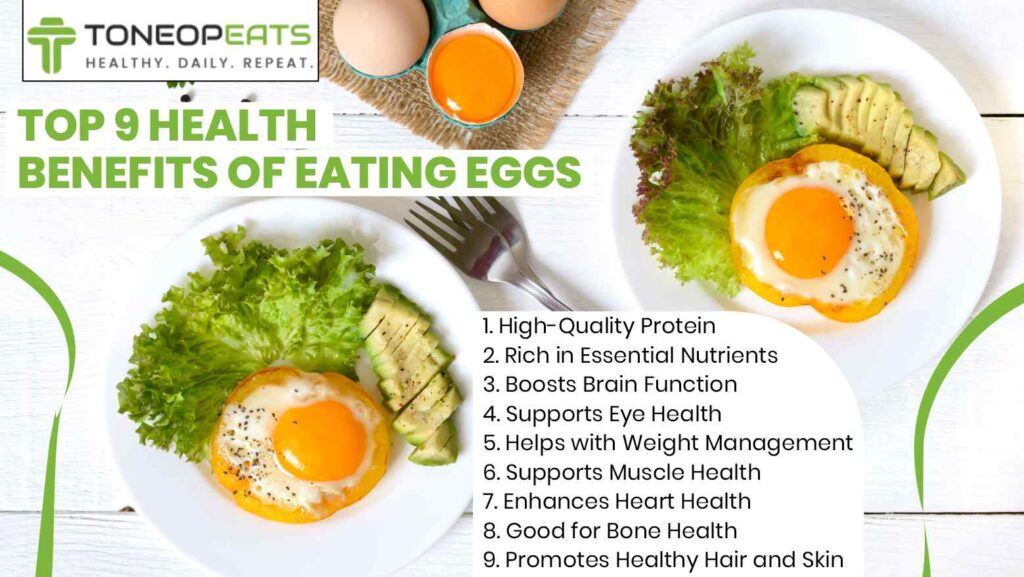A Complete Guide
Eggs are among the most nutritious and versatile foods available worldwide. Whether boiled, scrambled, poached, or fried, eggs provide essential nutrients that support health and wellbeing. Let’s explore their many benefits and how eggs fit into a daily diet.
1. Nutritional Powerhouse
A single large egg (about 50g) contains:
- 6–7 grams of high-quality protein
- 5 grams of fat (mostly healthy fats)
- 1.6 grams of saturated fat
- Less than 1 gram of carbohydrates
- Only around 70–80 calories
Essential Vitamins and Minerals
- Vitamin A – Good for eyes and skin.
- Vitamin B12 – Essential for nerve and brain health.
- Riboflavin (B2) – Helps convert food into energy.
- Folate – Crucial for cell growth and development.
- Iron, Phosphorus, Selenium, and Zinc – Support immune function and energy metabolism.
- Choline – Important for brain health and liver function.
- Vitamin D – Naturally present in few foods; helps with bone health.
2. Supports Muscle Growth and Repair
Eggs are considered a complete protein, meaning they contain all 9 essential amino acids that the human body cannot produce. This makes them excellent for:
- Muscle building
- Post-workout recovery
- Preventing muscle loss with age
3. Boosts Brain Health
Egg yolks are one of the best sources of choline, a nutrient that is essential for:
- Memory
- Brain development in infants
- Mental clarity and focus
Pregnant women especially benefit from choline for the baby’s brain development.
4. Promotes Eye Health

Egg yolks contain two powerful antioxidants:
- Lutein
- Zeaxanthin
These help protect the eyes from macular degeneration and cataracts, two common age-related issues.
5. Heart Health (When Eaten in Moderation)
Eggs contain HDL (good cholesterol), which is linked to a lower risk of heart disease. Although eggs also contain cholesterol, research shows that for most people:
Dietary cholesterol (like that from eggs) does not significantly affect blood cholesterol levels.
Instead, saturated fat and trans fats have more impact on heart health.
How Many Eggs Can You Eat Per Day?
The answer depends on your health, diet, and activity level.
For healthy individuals
- 1–2 whole eggs per day is considered safe and healthy.
- Some studies suggest even up to 3 eggs per day can be fine for many people, especially if the overall diet is balanced.
For those with diabetes or high cholesterol:
- Moderation is key.
- Consider limiting to 3–4 eggs per week, or consult a healthcare provider.
For athletes or bodybuilders:
- Can consume more eggs, especially egg whites, to boost protein intake without too much fat.
Ways to Eat Eggs in a Healthy Diet
- Boiled – No added fat.
- Poached – Gentle cooking, retains nutrients.
- Scrambled – Use minimal oil or cook with vegetables.
- Omelets – Add spinach, tomatoes, mushrooms, and peppers.
- Hard-boiled snacks – Great on-the-go option.
- Egg salads – Use Greek yogurt instead of mayo for a healthier version.
❗ Myths vs. Facts
| Myth | Reality |
|---|---|
| Eggs raise your cholesterol dangerously | In most people, eggs don’t cause major cholesterol increases. |
| Only egg whites are healthy | Yolks contain most of the nutrients like choline and vitamins. |
| Eggs are fattening | Eggs are low in calories and high in satiety, helping with weight control. |
Key Benefits of Eggs
Rich in high-quality protein
- Full of essential vitamins and minerals
- Support muscle growth, eye health, and brain development
- Contribute to heart health in moderation
- Affordable and versatile in cooking
If you have specific health conditions (like diabetes or heart disease), it’s best to talk to a nutritionist or doctor about how eggs fit into your diet.
